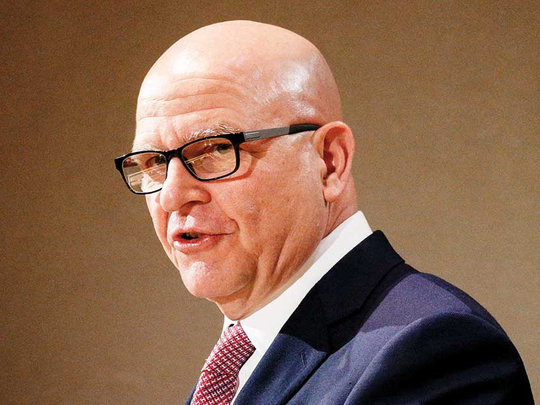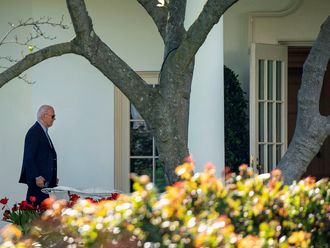
Washington
President Donald Trump is not about to oust his national security adviser, H.R. McMaster, according to White House Press Secretary Sarah Huckabee Sanders, even as speculation intensified that McMaster’s departure had already been decided.
Sanders tweeted on McMaster’s status late Thursday night following a Washington Post report that Trump had decided to replace the Army lieutenant general, who has led the National Security Council for more than a year. The Wall Street Journal later reported that Trump wants to remove McMaster and has conveyed his wishes to White House Chief of Staff John Kelly.
“Just spoke to @POTUS and Gen. H.R. McMaster — contrary to reports they have a good working relationship and there are no changes at the NSC,” she said in a Twitter post.
The Sanders tweet provided some reprieve for McMaster from speculation that he would be the next top official to leave the administration amid turbulence that has depleted Trump’s inner circle. That reprieve may only be temporary, some people familiar with the situation said, as it appears that Trump’s displeasure with McMaster has reached a critical level. The people were granted anonymity to discuss internal White House deliberations.
The president in recent weeks has seemed more determined to follow his own instincts and less inclined to heed the counterarguments of senior officials. Trump on Thursday said that there would “always be change, but very little” as he denied reports of a widespread staff overhaul. He added, however, that he wanted to “see different ideas” in his administration.
Although praised for the calm command and deep experience he brought to the National Security Council, McMaster has had run-ins with the president. Last month, Trump rebuked him on Twitter for neglecting to defend the president’s 2016 victory while discussing US claims that Russia had interfered in the election.
McMaster has at times been at odds with Kelly, Defence Secretary Jim Mattis; and Secretary of State Rex Tillerson, and that has contributed to the tenuous level of support he has at the White House.
He was also aligned with White House economic adviser Gary Cohn in the unsuccessful effort to talk Trump out of imposing tariffs on steel and aluminum. Some inside the White House believe McMaster endangered his standing with Trump by being too strident, according to a person familiar with deliberations. Cohn announced his resignation after the president went forward with the tariffs.
The Pentagon has been preparing options for a possible new job for McMaster, fuelling speculation that he would soon leave the White House.
Trump has been shaking up his national security team even as a planned meeting with North Korean leader Kim Jong Un approaches. The president fired Tillerson on Tuesday, saying the two had disagreed on the Iran nuclear deal and other matters of foreign policy. Mike Pompeo, the director of the Central Intelligence Agency and an ardent critic of the Iran accord, has been chosen to replaced Tillerson.
And there have been reports that more members of the Trump administration would soon be leaving. Sanders’ Twitter post appeared shortly after the Post article about McMaster was published online.
McMaster is to travel to California to meet Saturday with his counterparts from South Korea and Japan to continue discussions on North Korea, their third such meeting, a White House official said. The meeting reflects the depth of McMaster’s involvement on the North Korea issue that will be a central focus for Trump over the course of the coming months.
A veteran of the wars in Iraq and Afghanistan as well as the 1991 Arabian Gulf campaign, McMaster joined the administration a year ago after Trump dismissed his predecessor, Michael Flynn, for lying to Vice-President Mike Pence. He has travelled with Trump to several countries and helped craft the administration’s national security approach to North Korea, Afghanistan and Iran.
Before his White House appointment, McMaster had been directing the Army Capabilities Integration Centre, which is designed to implement warfighting capabilities among the military services and, as he described, “aggressively transform” Army operations. He was also the deputy commanding general for futures of the Army Training and Doctrine Command at Fort Eustis, Virginia.
In his 1997 book “Dereliction of Duty,” he criticised military officers for failing to challenge president Lyndon B. Johnson and secretary of defence Robert McNamara over their handling of the Vietnam War. He wrote that the US lost that war in the political corridors of Washington, not on the battlefield.











